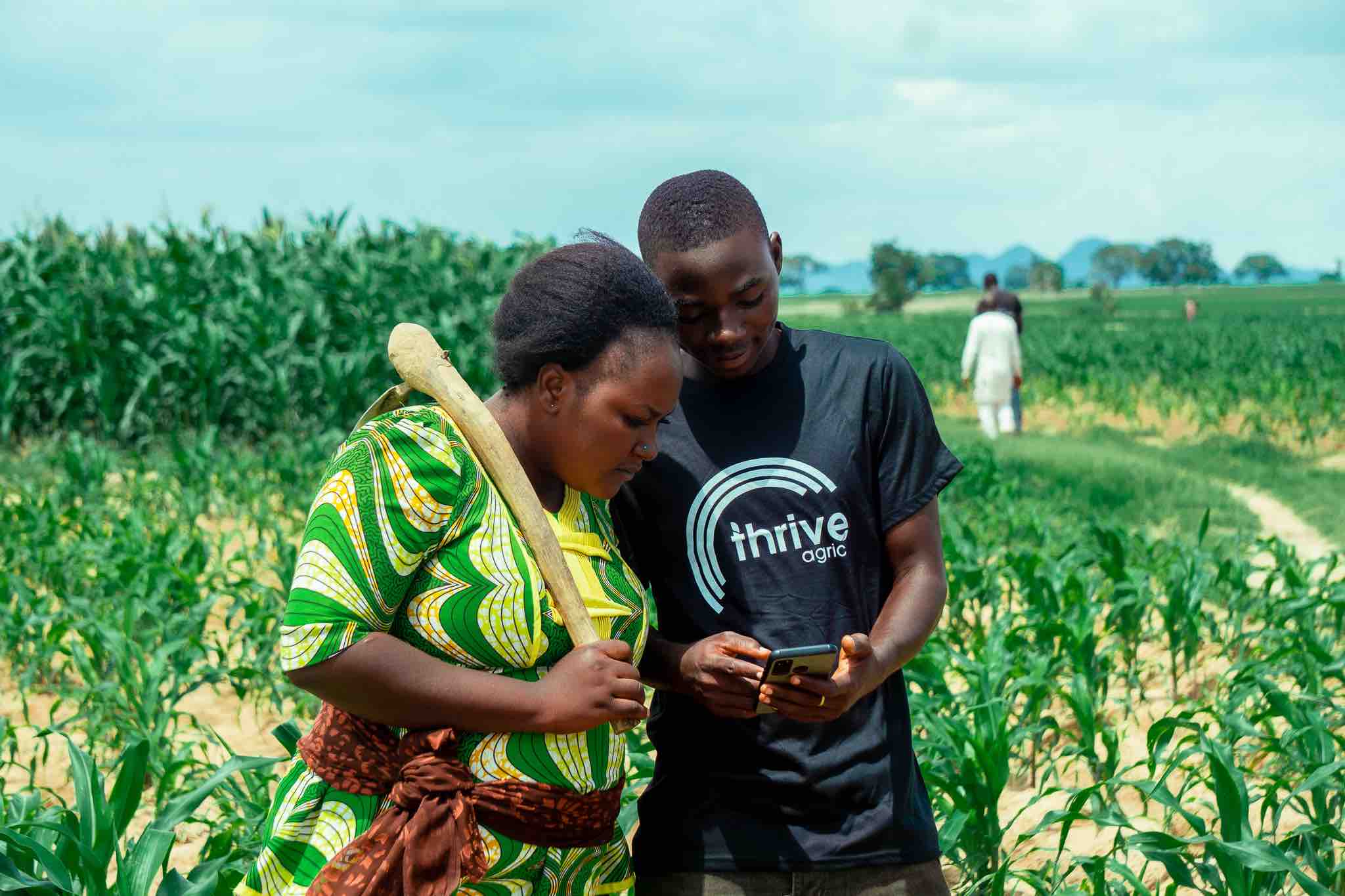“Africa needs profitable farmers to achieve food security. That is the network we are building.”
Oshone Anavhe is speaking about ThriveAgric, the Nigerian agtech startup where he works as VP of operations.
Founded in 2017 by Uka Eje and Ayodeji Arikawe as a fintech platform for smallholder farmers, ThriveAgric has since evolved into a broader marketplace platform and supply chain company. In its 2022 Impact Report [pdf], the company revealed it has granted $100 million of loans to 514,000 farmers and facilitated the production of 1.5 million metric tons of grain; farmers under its fold contribute at least 6.5% of grains to Nigeria’s national grain reserves.
The company, which has started venturing into new markets including Ghana and Kenya, has a target to provide $500 million in credit to 10 million smallholder farmers by 2027 and $1 billion to 20 million by 2050.
The Holy Grail of African agriculture
From the onset, ThriveAgric’s founders knew that if they wanted to achieve food security for Africa and save the $60 billion the continent spends annually on food imports, they would need to empower the smallholder farmers who produce nearly 80% of the continent’s food. Sorting out marketplace bottlenecks like access to quality farm inputs, up-to-date farming techniques and skills, quality storage, premium markets and access to finance was the seeming holy grail to do that.
Agriculture does not receive the attention it deserves across the continent, particularly among governments; many have failed to implement the 2022 Maputo Declaration to allocate at least 10% of their national budgets to the sector. Farmers on the continent — as with other parts of the world — are also often risk-averse, clinging to the old and archaic practices they know. Addressing these challenges has not been easy for companies like ThriveAgric.
But investors got behind its “one farmer at a time” onboarding process and the development of its suite of technologies to support them.
Venture Platform was among the first investors to acknowledge ThriveAfric’s potential in “boosting food security and transforming rural economies” when it invested $180,000 in pre-seed funding in 2017.
Since then, funding has been forthcoming; in 2022, the agritech startup raised $56.4 million in debt financing from local commercial banks and institutional investors. The funding included a co-investment grant of $1.7 million from the USAID-funded West Africa Trade & Investment.
“We have received tremendous support from financiers in our growth journey,” explains Anavhe.

From fintech to an agriculture operating system
As is often the case in Africa’s agtech ecosystem, what started out as a tool to provide farmers with financing has since evolved into a much broader marketplace platform with technology at its core.
ThriveAgric’s Agricultural Operating System (AOS) is the backbone of its operations. The system is used to onboard farmers, map their lands and conduct soil tests and analyses, with the outcomes informing the startup’s precision farming choices and climate-smart practices.
The system, which works entirely offline, is also used by field agents to provide financing to farmers, and by farmers to facilitate the sale of their harvests by linking them to local and global markets. This has resulted in farmers being able to increase their incomes by 25% by charging premium rates for their commodities cutting across soybeans, paddy rice, maize, sorghum, millet and wheat.
According to Anavhe, the deployment of the technology has been the heart of driving productivity, improved food quality, increased profitability, environmental sustainability and resilience.
But the company did not stop there and went on to invest in over 450 warehouses to store the inputs its provides through the marketplace, thus giving farmers access to better quality seeds, fertilizers and equipment.
How to produce food year-round
Next up the company is taking on a new challenge: to enable farmers to produce food throughout the year.
Around 95% of food production in Africa/Nigeria is dependent on rain, which means that the dry season is mostly under-utilized due to the absence of necessary infrastructure and the widespread unavailability of drought-resistant inputs.
To help farmers produce food during the dry six months of the year, ThriveAgric has started distributing inputs for dry season farming in northern Nigeria, targeting about 100,000 smallholder farmers in areas that are close to water bodies. This includes irrigation equipment and drought-resistant inputs like seeds, fertilizer and crop protection products.
The ultimate goal is to facilitate the production of over 300,000 metric tons of grains during the 2023/24 dry season.
“We want to break the cycle where 95% of food production is done in six months with everybody then waiting until the following year,” Anavhe tells AgFunderNews.
For the dry season inputs distribution program, ThriveAgric is replicating its strategy that has effectively worked during the wet seasons of access to credit for smallholder farmers. The strategy involves providing inputs on credit to farmers who are organized in groups of three to five to make it easier to manage at scale and to ensure efficiency. It also helps farmers get access to insurance against the many climate hazards associated with the dry season such as bushfires.
Mercy Corps Ventures, an active seed- and early-stage investor in emerging markets, is among partners the firm has worked with in a program aimed at reducing post-harvest loss and its effects on 6,000 smallholder farmers in three states of northeastern Nigeria.
The agritech has also worked with Heifer International to help smallholder farmers — the majority of which are women — in Nigeria, Kenya and Botswana commercialize poultry farming and access to crop insurance to 10,000 rice farmers.





